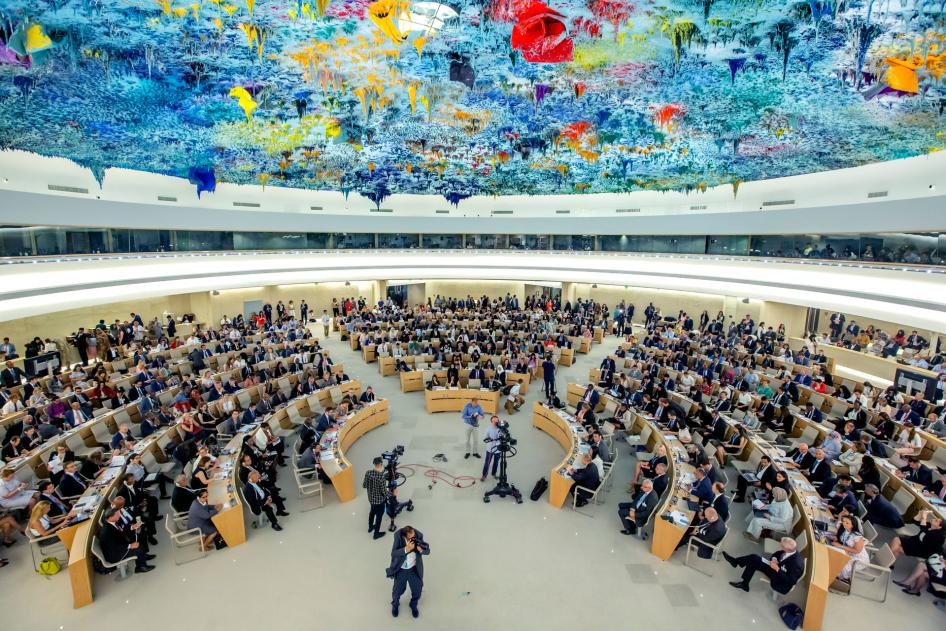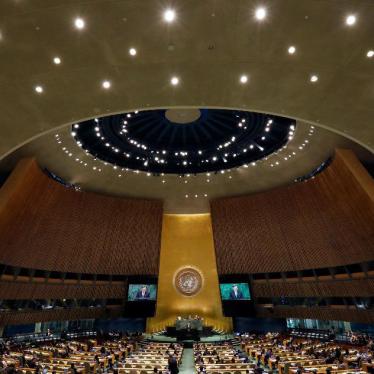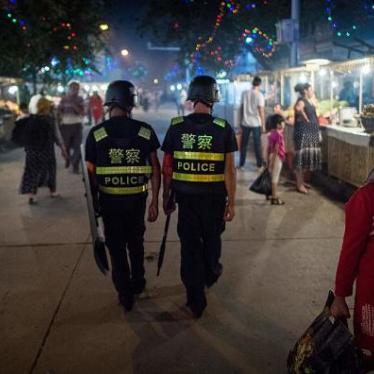France is running on a closed slate with the United Kingdom to be elected to a three-year term on the Human Rights Council at the United Nations. Its election to the Council is therefore a foregone conclusion. As the self-declared country where the concept of human rights was born, a claim based on the 1789 Declaration on the Rights of Man and the Citizen adopted shortly after the fall of the Bastille, one would expect France to bring a principled voice and role to the Council. Yet, operating from the margins of the Council, France of late has been neither active nor constructive in defending human rights– quite the opposite.
This year alone, France has either opposed or belatedly and resignedly joined efforts led by its allies in Europe to bring scrutiny and accountability to the human rights violations in situations as different as China, Libya, Saudi Arabia, and Yemen. Time and time again France has missed the opportunity to be an active player, using its influence and leverage with the EU and beyond to increase support for the initiatives led by its European allies.
On June 22– thanks to the efforts of Finland, the Netherlands, Switzerland, and the United Kingdom, among others– the Human Rights Council established a fact-finding mission to document violations by all parties to the Libyan conflict since April 2016, and preserve evidence with a view to ensuring perpetrators will be held accountable. France, however, was not supportive of this effort, trying to apparently limit the mandate and impact of the fact-finding mission, while insisting on a reference to the International Criminal Court. Yet despite its alleged commitment to the Court, France has not explained how its support for General Khalifa Haftar, who heads one of the forces fighting for power in Libya, is in line with his refusal to arrest and surrender his deputy, Mahmoud Al-Werfalli, who has an outstanding arrest warrant issued by the Court in 2017 for war crimes.
On June 30, the United Kingdom led a cross-regional statement signed by 28 states expressing “concern about arbitrary detention, widespread surveillance and restrictions” targeting Uyghurs and other minorities in Xinjiang and the “imposition of legislation related to national security on Hong Kong.” The United Kingdom had delivered a previous statement in 2019, which France joined, yet this time France insisted on an EU statement, muddying the waters and putting the effort of the United Kingdom at risk. Faced with the reality that several EU states were ready to support the United Kingdom, France resignedly signed on to the statement at the eleventh-hour.
On September 14, Denmark presented a joint statement on Saudi Arabia, signed at the time by 29 states, in which they expressed that they were “deeply concerned by reports of torture, arbitrary detention, enforced disappearances,” and the “persisting discrimination of women and girls,” and calling for the “release of all political prisoners” as well as “transparency and holding all those responsible accountable” for the murder of Jamal Khashoggi. France was not one of them. Trailing behind, France only signed the joint statement days after its delivery at the Council.
As the current session of the Human Rights Council draws to a close, France has fortunately corrected course on Yemen on the question of the renewal of the Group of Eminent Experts that is investigating violations committed by all parties to the war in Yemen. The Group is the only credible accountability mechanism for Yemen, one that has shown its independence by pointing to “third states”– among them France– that supply arms to the parties to the conflict. From being irked by the finger-pointing and opposed to a strengthened mandate for the Group, it now has joined its European allies in supporting a stronger mandate to collect evidence and unhindered access to Yemen, currently denied by the Saudi-led coalition fighting the Houthis.
It has also fortunately set aside its proposal to replace the Commission of Inquiry on Burundi, established by the Human Rights Council in 2016 and renewed every year, with a comparatively toothless special rapporteur. The proposal was based on the questionable premise that the new government in Bujumbura– composed of “hard-liners” from the regime of the recently deceased President Pierre Nkurunziza– deserves a chance to show its good standing on human rights. The Council disagreed with this premise in renewing the mandate of the Commission on October 6 by 24 votes, including France, against 6, and 17 abstentions.
Despite claiming a steadfast commitment to multilateralism and human rights, France has in fact hampered multilateral efforts within the Human Rights Council under the dubious strategy of wanting to ensure that the EU speaks with a single voice. Yet, time and time again, it has either not joined efforts for much-needed scrutiny and accountability, or done so belatedly and resignedly. Nor has it taken the initiative to lead on any contested country resolutions or joint statements, such as on China, Egypt, Saudi Arabia or the Philippines, while other smaller states with far less global influence have shown such leadership.
Through its repeated– and failed– insistence that it does not want to weaken EU unity by joining initiatives that do not enjoy full EU support, France is effectively handing a veto to the lowest denominators within the EU. With Hungary and Poland already facing Article 7 proceedings under the European Union Treaty due to violations to the rule of law and human rights, France risks letting Budapest or Warsaw be the ultimate arbiters.
While EU unity is important, unity as an end in itself at the price of surrendering to the lowest denominator is not leadership. The recent course corrections with regard to Burundi and Yemen are hopefully a sign that France is ready to revisit its overall strategy at the Human Rights Council. A useful next step would be for it to lead an initiative to bring scrutiny to a neglected country situation.
“Leading from behind” is the catch-all phrase that many associate with the foreign policy of President Barack Obama. Unless there is a complete course correction soon, the foreign policy of France at the Human Rights Council, may well come to be summarized as “trailing from behind”. It should not seek a seat on the Council to take a back seat.
Let’s hope that once elected to the Council, France will show some spine and work with its friends and allies in making multilateralism work in the defense of human rights both near and far.










